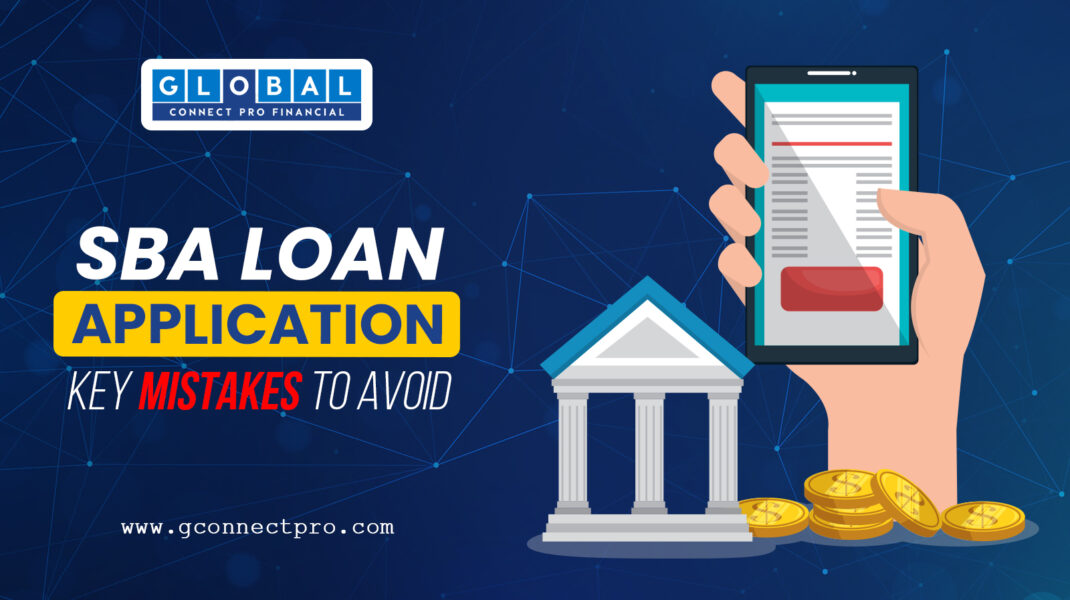Common Mistakes to Avoid When Applying for an SBA Loan

Applying for a Small Business Administration (SBA) loan can be a great way to get the funding your business needs to grow. However, the process of SBA Loan Application can be complicated, and making mistakes can delay approval or even result in a rejection. Here are some common mistakes to avoid when applying for an SBA loan.
Avoid These SBA Loan Mistakes for a Smoother Application
1. Incomplete or Inaccurate Paperwork
One of the most common mistakes is submitting incomplete or inaccurate paperwork. The SBA loan application requires detailed financial records, business plans, and personal financial information. Leaving out documents or providing incorrect details can delay the process or lead to rejection.
How to Avoid It: Before submitting, double-check your paperwork to ensure everything is complete and accurate. Working with a financial advisor or loan specialist can also help make sure you’ve covered all your bases.
2. Poor Credit Score
Your credit score plays a significant role in determining whether you’ll qualify for an SBA loan. Many business owners overlook this aspect or assume that business credit alone will suffice. In reality, both your business and personal credit scores will be considered.
How to Avoid It: Check your personal and business credit reports before applying. If your credit score is low, take steps to improve it by paying off outstanding debts and avoiding new lines of credit.
3. Lack of a Clear Business Plan
SBA lenders want to see that you have a well-thought-out business plan. Without a clear and convincing plan, lenders may hesitate to approve your loan, as it indicates you may not have a strong strategy for using the funds wisely.
How to Avoid It: Prepare a detailed business plan that includes market research, financial projections, and a clear explanation of how the loan will help grow your business. The more prepared you are, the better your chances of approval.
4. Applying for the Wrong Type of Loan
There are several types of SBA loans, such as the 7(a) loan, 504 loan, and microloans, each suited to different business needs. Applying for the wrong type of loan can delay the process or result in a rejection.
How to Avoid It: Research the different SBA loan programs or consult with a financial advisor to determine which loan best fits your business’s needs. Applying for the right loan type increases your chances of success.
5. Overlooking Collateral Requirements
SBA loans often require collateral to secure the loan. Some business owners overlook this requirement or assume their business assets alone will suffice, only to be surprised when they are asked for personal assets as well.
How to Avoid It: Be prepared to offer collateral, which could include business assets or personal property like real estate. Knowing this in advance can help you avoid any unpleasant surprises during the loan process.
6. Underestimating the Time It Takes to Get Approved
SBA loans can take longer to process than traditional loans due to the detailed application process and government involvement. Some business owners underestimate how long it will take to get approved, leading to cash flow problems or missed opportunities.
How to Avoid It: Plan ahead. If you know you’ll need financing, start the application process early, well before you need the funds. This will give you time to address any issues that arise during the approval process.
7. Failing to Prepare for the Interview
In many cases, SBA lenders will want to meet with you to discuss your business and your plans for the loan. Some business owners treat this interview casually, assuming their paperwork will do all the talking. However, the interview is an important part of the process, and failing to prepare can hurt your chances.
How to Avoid It: Treat the interview like a job interview. Be ready to explain your business model, your financials, and how you plan to use the loan. The more confidently and clearly you can communicate your plans, the better impression you’ll make.
8. Not Having Enough Cash Flow
Lenders want to see that your business has enough cash flow to make the loan payments. If your cash flow is insufficient, it could raise red flags that your business might struggle to repay the loan.
How to Avoid It: Before applying, ensure that your business has a stable and sufficient cash flow. This may involve cutting unnecessary expenses, boosting sales, or finding ways to increase revenue.
9. Ignoring SBA Guidelines
The SBA has specific guidelines for how their loans can be used, and not following these guidelines can result in rejection. Some business owners ignore these rules, assuming they can use the loan for whatever they want.
How to Avoid It: Make sure you understand the SBA’s guidelines and restrictions on loan usage. Stick to the allowed purposes, such as working capital, equipment purchases, or refinancing existing debt.
10. Rushing the Application Process
Applying for an SBA loan is not a process to rush through. Trying to speed through the application increases the likelihood of mistakes, such as missing paperwork or providing inaccurate information.
How to Avoid It: Take your time. Carefully review all requirements and gather the necessary documents. Rushing the process often leads to delays or rejections, so it’s better to be thorough from the start.
Conclusion
Getting an SBA loan can be an excellent way to finance your business, but it requires careful planning and attention to detail. By avoiding these SBA Loan Application Mistakes, you can improve your chances of getting approved and securing the funding you need. Double-check your paperwork, make sure your credit score is solid, and prepare a detailed business plan to set yourself up for success.


Write a reply or comment
You must be logged in to post a comment.